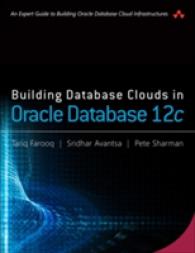- ホーム
- > 洋書
- > 英文書
- > Business / Economics
Full Description
Microeconomicsexplore core microeconomics concepts by focusing on current events in economics and providing a theory refresher for each section and questions. Case studies differ from news articles in that they are written specifically for students at a level they can easily relate to, and are presented in such a way that the theoretical concept being taught can be applied. It's intended as a stepping stone into using authentic articles as they progress.Each case study presents a different application of a core concept or theory. The core concept that is applied in each case study is listed in the book's table of contents. As well as the main text, which presents the application of the core concept, each case study contains a range of extra material. A 'Theory refresher' section provides a quick way for students to revise a key concept or theory that is important for understanding the application in that case study. In most case studies, the theory refresher is on the core concept or theory being applied; the only exceptions come where a core concept has been applied in a previous case study and covered in the theory refresher in that case study. The table of contents also lists the theory refresher for each case study. Also appearing in each case study is a set of 'Key lessons' that summarise the main points, 'Some questions to think about' and 'Ideas for further reading'.
Contents
1.Scarcity, decision-making, incentives and tradeconcepts in economics1.1 What did that really cost you?1.2 Opportunity cost and productivity in agriculture1.3 The benefits and costs of a university degree1.4 How incentives make the world go round1.5 Do incentives really matter: Can economic policy change the timing of births and deaths?1.6 How creating extra opportunities for trade can improve wellbeing: kidney exchange and ICT1.7 Are we always rational?2.Demand, supply and equilibrium in competitive markets2.1 What determines demand?2.2 Does equilibrium exist? Evidence from experiments2.3 Something fishy? No, it's just a matter of supply and demand2.4 Explaining changes in the price of oil: Not so slippery when you use supply and demand 2.5 The great economic spectacle: the ups and downs of the US$/A$ exchange rate2.6 Reducing child labour: Which policy works best?2.7 How much should we protect our natural environment?2.8 Are ticket scalpers worse than used car salesmen?2.9 Careful how you punish: why restricting CEOs' pay may hurt us more than them2.10 Has the alcopop tax been a party pooper?2.11 Using prediction markets in business and public policy3.International trade3.1 Why do we trade?3.2 Infinitely inventive: a million ways of protecting your country's producers (and harming everyone else)3.3 Have globalisation and the expansion of international trade improved wellbeing?3.4 What's ours is ours - Putting a stop to exports4.Market failure and government policy4.1 Externalities are everywhere4.2 How can we unjam traffic jams?4.3 Why would we want to trade pollution?4.4 Getting vaccinated against influenza: there is a 'win-win' in economics4.5 The Bush Tender scheme and conservation activity4.6 Why is copying bad?5.Theory of the firm and managerial economics5.1 Are costs important?5.2 How much does a university education cost?5.3 Cutting costs by finding new ways to produce5.4 Should you make or should you buy?5.5 The path to market power: When can your business charge high prices without losing all of its customers?5.6 The Resource Super Profits Tax: how it could have been super5.7 The ups and downs of supply in Australia's iron ore industry5.8 The mystery of sausage roll prices5.9 Innovation and imitation: dynamics in a competitive market5.10 Sell low and sell high: making higher profits using price discrimination5.11 Smart regulation of a monopoly: how Australia pays less for pharmaceutical drugs6.Game Theory6.1 When telling the truth is the best policy: using game theory to bid on eBay6.2 Can game theory make you a game show champion?6.3 When two sides go to war: how nobody wins6.4 The corruption game6.5 It's not how you move but when you move that matters7.Labour markets7.1 Beauty or computer skills: Which will most increase your pay?7.2 Superstars and the growing incomes of the very rich8.Economics of information8.1 To be sure, insure8.2 Does pay for performance work?







